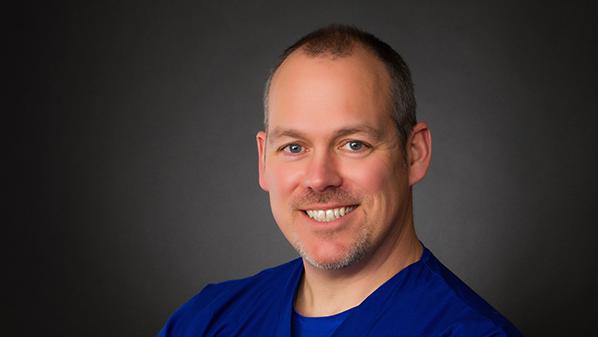
Physician Blog by Craig A. Miller, MD
How Dr. Craig Miller Uses New Technology to Improve Shoulder Replacement Surgery
Medicine is constantly evolving. New discoveries and new technology make treatments more efficient. At OrthoBethesda, we believe we should implement these innovations to help our patients to better outcomes.
Dr. Craig Miller was the first surgeon in the Washington, DC area to routinely perform computer navigation in his shoulder replacement surgeries to provide greater safety, precision and faster recovery for his patients. Dr. Miller specializes in shoulder surgery and has a background in sports medicine. Shoulder surgery has long proved challenging because of the relatively small area around the shoulder compared to larger bones, such as the hip or knee. The cutting edge Exactech GPS computer navigation technology that he uses gives him a better overview when he operates by showing him the bigger picture on a screen. Not only can Dr. Miller see what is in front of him, but also where his instruments are going inside his patients’ bodies! He was one of the first surgeons in the nation to use this impressive tool.
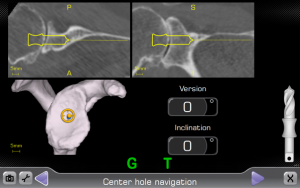
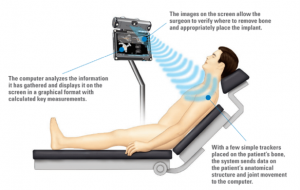
How Does Computer Navigation Work?
This technology allows Dr. Miller to create a virtual model of the shoulder he plans to operate on using a computer. Before the surgery the patient has a CT scan of their shoulder performed. The raw image data from the CT scan is converted into a virtual 3D model of the patient’s shoulder. This model is loaded into a computer program that allows Dr. Miller to virtually perform the surgery on the computer and then show the patient what their new shoulder will look like.
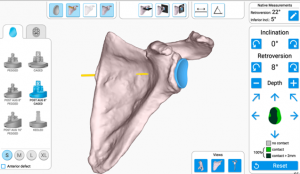
During the surgery a small tracker is attached to the patient. Trackers on the surgical instruments then show Dr. Miller where his instruments are in real time and allow him to reproduce his pre-operative surgical plan more accurately and safely than any other technique available in his opinion.
Why Does Computer Navigated Total Shoulder Replacement Using Exactech GPS Deliver Better Results?
Dr. Miller has noted several benefits to using the Exactech shoulder GPS, including:
- More accurate and anatomic placement of the patient’s new shoulder.
- Improved safety during the surgery.
- Better range of motion.
- Faster recovery.
- Expected increased longevity of the new shoulder.
All of these advantages relate to one another. Research has shown that the surgery comes within 2 degrees and 2 mm of the pre-operative plan. The added precision results in a less-invasive surgical procedure, so patients need less time to recover. The less time they need for recovery, the shorter their post-operative stay at the hospital, and the sooner they can be released. Most patients can go home the same day or spend only one night in the hospital.
Patients also enjoy cost savings from these improvements. Less pain and post-operative care results in reduced costs. Dr. Miller has noted fewer post-surgery complications for his patients, as well as improved outcomes.
Finally, it is expected that since the shoulder replacement is being performed more accurately than ever before, then it will last longer than ever before. Longer-lasting implants also mean less need for future surgery.
-Craig Miller, MD
Dr. Miller of OrthoBethesda was the first surgeon to perform computer navigated total shoulder replacement in the Washington, DC area.
Dr. Miller was selected to be one of the first surgeons in the country to use Exactech shoulder replacements by a former mentor who helped develop the surgical method. Due to his experience and successful outcomes, Dr. Miller has been invited to teach other surgeons in the United States how to use the Exactech GPS shoulder replacement technique. Dr. Miller has been performing shoulder replacements since 2002. He anticipates the technique could be used with great success for knee surgeries in the future as well. Read more here and make an appointment with Dr. Miller today.
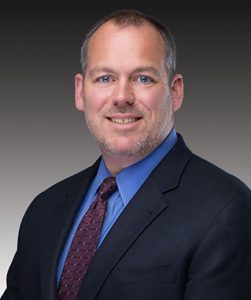
Related Content
- Can a Rotator Cuff Tear Heal Without Surgery?
- Can You Drive After a Rotator Cuff Repair?
- Complete vs. Partial Rotator Cuff Tears
- Rotator Cuff Disorders: The Facts
- The Difference Between Rotator Cuff Tears and Shoulder Tendonitis
- Types of Rotator Cuff Tears
- When Not to Have Rotator Cuff Surgery
- Shoulder Pain – Frozen Shoulder
- How to Avoid Shoulder Pain While Playing Golf
- Why Sleeping on Your Side Is Killing Your Shoulder
- Shoulder Pain – Cervical Spine
- The Ultimate Guide for Shoulder Recovery Surgery
- Does a Broken Shoulder Need Surgery?
- Shoulder Arthritis and Shoulder Replacement
- How to Sleep After Shoulder Surgery
